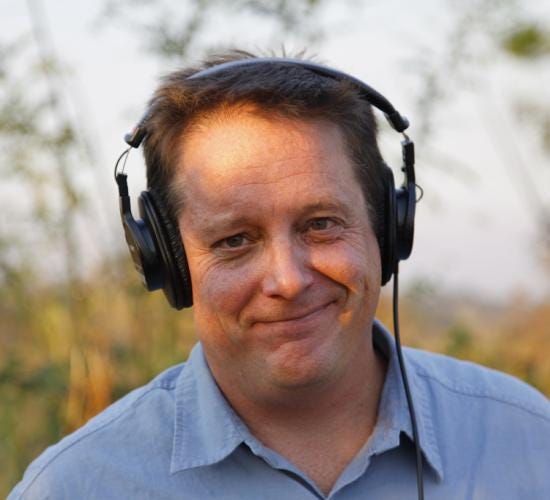
The Sound School Podcast has passed 350 episodes. It is defined simply as “the backstory to great audio storytelling, hosted by Rob Rosenthal, for Transom and PRX.”
However, the podcast is only ten percent of the iceberg above the surface water, while it is underneath the structure that generates much of its size, power, and energy.
That
underneath structure is Transom, which produces Sound School Podcast,
fosters the art of audio storytelling, honoring the original public
service, educational, and creative goals of public broadcasting.
Jennifer
Jerrett, Managing Editor of Transom, explains: “Transom fosters the art
of audio storytelling, honoring the original public service,
educational, and creative goals of public broadcasting. We are a
training center, a collaborative space, offering both online and on-the-ground workshops, a showcase for new work, and an archive of resources. Our aim
is to be useful and inspiring. We pass the baton of mission and good
practice in podcast, broadcast, and performance through tools,
techniques, values, and community.”
Jennifer explains that the use of TRANSOM — “TRAN-sum.”
“A
small hinged window above a door, allowing light and ventilation into
hallways of older buildings. Unsolicited manuscripts were submitted over
the transom at magazine and newspaper offices.”
Historically, Transom was administered by Atlantic Public Media (APM). APM is a non-profit organization based in Woods Hole, Massachusetts, which has as its mission, “to serve public broadcasting through training and mentorship, and through support for creative and experimental approaches to program production and distribution.” APM is also the founding group for WCAI, public radio for the Cape, Coast, and Islands under the management of WGBH-Boston. After Transom, APM co-founded (with SRG) the Public Radio Exchange (PRX) — an online marketplace and distribution center for radio content. APM also produces The Moth Radio Hour and various other projects.
Jennifer says: “The idea for Transom grew out of a desire to hear more interesting stories and diverse voices on the air, to empower citizens to tell their own stories, and bring together the worlds of public radio and online community. Jay Allison, Executive Director of APM and founder of Transom, has been involved with public radio since the 1970s. Under his visionary leadership, Transom grew into what it is today — an internationally recognized leader in the audio arts.”
Transom offers Traveling Workshops, which are on-site, week-long, intensive training sessions for beginning-level students. Its next program runs August 24–31, 2025, at Interlochen Center for the Arts in northwest Michigan. Applications are open now.
Now,
the podcast exists as an audio classroom for those interested in the
audio format, similar to Elaine Appleton Grant’s Sound Judgment podcast.
As an aspirational writer, the recent two-part episode
“Writing makes all the difference” struck home for me, and I’m sure for
many others. Host Rob Rosenthal begins by explaining the obvious: Great
opening writing ignites ear-worthy audio. The writer’s opening line is:
“It takes 28 gallons of fuel and a spark to burn a human body.” How can
anyone stop the audio there?
On the March 26th show, host
Rosenthal exclaims: “The best way — sometimes the *only* way — to
describe an element in a story that is disruptive and distracting for
listeners is this: chicken bomb. This year, 2025, is the 20th
anniversary of “chicken bomb” entering the lexicon of audio
storytelling. What exactly is it? With help from Ira Glass, we’ll
explain.”
Rob Rosenthal is an excellent host, obviously heavily invested in audio storytelling. He presents his examples of audio that listeners can learn from, using easy-to-understand concepts, along with tips and tricks to employ.

Rob
is a story editor, reporter, and producer for radio, podcasts, and
multimedia. He recently story-edited a major production called The
Turning, a series about former nuns in Mother Teresa’s order, and a
series for the Children’s Radio Foundation called I Will Not Grow Old
Here, about a young woman trying to find her way out of a township in
South Africa. He’s currently working on projects with Rococo Punch,
Pacific Content, Goat Rodeo, and ACB Stories.
Rob taught
documentary reporting and storytelling for over twenty years at The Salt
Institute for Documentary Studies and The Transom Story Workshop.
Students in his workshops have gone on to work in public media and
podcasting.
In the August 27th show, Rosenthal covers a topic that bedevils almost all podcast hosts and guests. SWEARING.
Rob explains: “Say you’re listening to a great narrative podcast. The host has really grabbed your attention, and you’re pulled in. Then, out of nowhere, the narrator swears. Not once. Not twice. But three times. Including f-bombs. Is that a turn-off for listeners? Should narrators swear? On this episode, podcaster Dan Taberski defends his swears in his latest podcast.”
Organizations like Transom.org are essential because they foster the art of storytelling. Some take that skill for granted, but they shouldn’t. There are top-rated podcasts where the host or hosts seriously lack these basic skills. There are thousands of aspirational podcasters who cripple their already-slim chance for success by discarding the concept of audio storytelling as an essential skill.
Sound
School Podcast is a storytelling-centered sound universe that is an
audio treasure of skills, creative direction, technical expertise, and
verbal coaching. I think the show is a must-listen audio for anyone
wishing to become an audio storyteller.
Rob Rosenthal photo by Ed Kashi
Comments
Post a Comment
Thank You for your input and feedback. If you requested a response, we will do so as soon as possible.